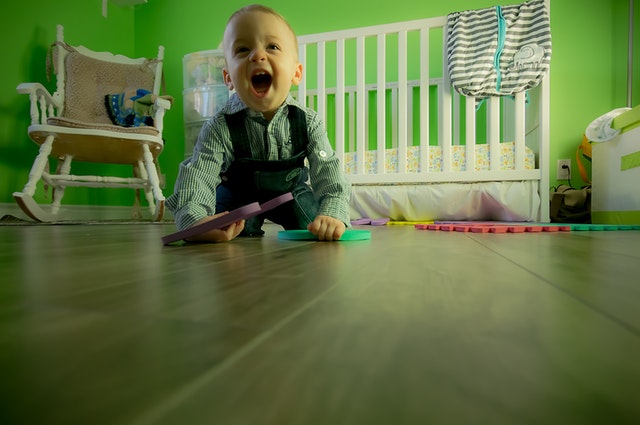Oral Hygiene at Home
Unfortunately, you don’t get healthy teeth by accident. Good oral hygiene habits start at an early age in the home. While receiving regular dental cleanings and other ongoing care and maintenance is a must, making sure your child’s smile is cared for at home is just as important.
When it comes to the oral health of your family, don’t take any chances. Establish good habits early on; these are the foundational years for your child’s future. If a high priority is placed on oral health from a young age, your child will be much more likely to follow through with it as they become adults.

INFANTS
Oral hygiene should be practiced from the first meal your baby eats.
After nursing or a bottle, wipe your infant’s gums, tongue, and cheek with a moistened cloth. This will remove any liquid or build-up created.
Do not put your infant to bed with anything other than water.
Dental bacteria can be transmitted. Avoid putting anything in your infant’s mouth that’s been in someone else’s mouth. This means no cleaning pacifiers with your saliva or sharing spoons!

CHILDREN AND ADOLESCENTS
Once children are old enough, they will need to brush and floss just like adults. Until your child is 12, make sure to supervise and assist them to ensure they are brushing and flossing properly.
BRUSHING TEETH
Children’s teeth should be brushed twice a day for at least two minutes. Use a toothbrush with soft bristles. Scrub in small circles along the gum line and all surfaces of the teeth.
FLOSSING
Your child’s teeth should be flossed once a day, preferably in the evening. If there are teeth touching (i.e. you cannot see pink gum tissue between them), they are particularly important to floss.
Tips for flossing your child’s teeth:
- Use a piece of floss about 12 to 18 inches long. A fun and easy way to get the right length is to have your child stretch the floss out until it touches their elbow.
- The floss should be wrapped around the middle finger of each hand, so the thumb and first finger can be used to guide the floss gently between teeth.
- An easy alternative is buying a flossing aid, which can be found at most pharmacies or grocery stores. These make the flossing process much simpler for you and your child.

Toothpaste
For children above the age of four, fluoride toothpastes are a great option. Children younger than four, and those above four who cannot effectively spit, should use a children’s toothpaste without fluoride or a gum cleanser.
For fluoride toothpaste, use a portion about the size of a pea on the toothbrush. Any more and your child may ingest too much fluoride. Too much fluoride could cause damage to the enamel of developing permanent teeth.
What Our Patients Say
“I can’t say enough about how great they are with my son. He was so nervous but that went away quickly when Dr.Dihn explained everything she was going to do and made sure he didn’t have any questions. The assistant Arianna put on a movie and talked to him to keep him distracted and calm. He walked out smiling and happy and I couldn’t ask for a better experience at the dentist. Thank you guys for taking such good care of him!”
– Liz M.
Call Children’s Dentistry of Charlottesville at (434) 817-1817 or contact us online to learn more about how dental exams can help your child.
Frequently Asked Questions
Should My Child Use a Fluoride Rinse?
Fluoride rinses are helpful in preventing cavities from forming between teeth. They are available in many different mild flavors. If your child cannot spit, avoid a fluoride rinse.
Is It Safe for My Child to Use Xylitol-Containing Gum
Chewing a xylitol-containing gum once or twice a day for fifteen minutes can be useful and can reduce cavities in children. Xylitol can be found in many common gum products, and is listed as an ingredient when present.
Is it Safe for My Child to Eat Sugar?
While it is okay for your child to eat some sugary treats, limit the amount they eat. It takes saliva 30 minutes to neutralize the acidity created by decay-producing bacteria. While this is okay some of the time, repeated eating of sugary snacks may increase the chances of tooth decay.
Is It Okay for My Child to Eat or Drink Before Bed?
When a child eats or drinks before bed, food or drink will linger in their mouth until morning! This can lead to increased likelihood of tooth decay. Try to limit any beverages before bed to water. If food must be eaten, make sure their teeth are brushed well before going to bed.
Testimonial
 Super friendly staff, extremely clean and sterile environment without being cold and harsh. my son is autistic and he even loved it! So happy to have found them!
Super friendly staff, extremely clean and sterile environment without being cold and harsh. my son is autistic and he even loved it! So happy to have found them!
— Chrissy Huber
Do You Have Any Additional Oral Hygiene Resources?
Yes! We’ve put some additional resources below to help you keep your child’s smile healthy!
Do you accept insurance or Medicaid?
Yes! We accept Medicaid as well as many other insurance plans, including those from:
- Guardian
- Metlife
- Cigna
- United Concordia
- Delta Dental
- Anthem

